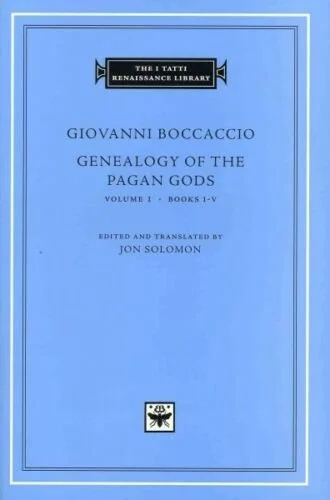Book Review: Geneaology of the Pagan Gods
/Genealogy of the Pagan Gods, Vol. 1
Giovanni Boccaccio
Translated and edited by Jon Solomon
I Tatti Renaissance Library, 2011
The best scholarship explodes habitual thinking, and there are two kinds of habits most readers fall into when it comes to beloved authors like Boccaccio. One of these habits is general: readers often tend to focus on that one magical work of an author to the exclusion of all else - sometimes to the omission of all else. That one work need not be the best thing the author ever wrote (ironically, if often isn't), but it will always be the one in which the author's gifts were on fullest, liveliest display for good or ill - hence how overshadowingly memorable they are. Readers think of Chaucer and "The Canterbury Tales" in one mental image, even though the work is unfinished and inferior on technical grounds to "Troilus and Criseyde." Modern audiences hear 'Edwin O'Connor' and think The Last Hurrah, 'Anthony Burgess' and think A Clockwork Orange, 'Joseph Heller' and think Catch-22, 'William Golding' and think Lord of the Flies ... when in all cases the authors not only wrote stacks of other books but stacks of better books.
Likewise this is surely true of Boccaccio, whose name is forever synonymous with The Decameron, a rollicking and wonderful collection of stories the author wrote in ornate and playful Italian. "Boccaccio's Decameron" has become such a name in Freshmen English courses throughout the world that many readers would be surprised to learn the man wrote anything else at all. And those same English courses perpetuate the second lazy habit of thinking in question, this one specific to Boccaccio: that in the early 1350s the author had his literary conceptions changed by several long interviews with Petrarch, and that as a result of those changes he switched from writing in stories in Italian to writing treatises in Latin - and immediately lost his readability.
Readers more familiar with the author knew better - knew, in fact, that the work that is very likely the magnum opus of his life was one almost entirely unknown to the general reading public: Genealogia deorum gentilium, which translator Jon Solomon renders as "Genealogy of the Pagan Gods," a truly stupendous effort in which Boccaccio references hundreds of ancient Greek and Roman sources in over a thousand citations - a stunningly masterful synthesis of all classical mythology, running to over 700 chapters.
The whole thing is an utterly amazing performance, a towering masterpiece of Renaissance humanism, and here, as one of the latest entries in Harvard University Press' I Tatti Renaissance Library, it gets its very first unabridged translation into English. Jon Solomon does the honors, everywhere using a deftly light touch that works perfectly to bring out the relatively straightforward simplicity, sometimes called 'arid' by those who go into the work expecting frolics in the Tuscan hills, of the Latin Boccaccio uses in this teeming work.
In this work (I Tatti plans to publish the whole thing in three volumes), Boccaccio sets himself a task very similar to that hopeless vanity-project embarked upon by dry-as-dust Mr. Casaubon in Middlemarch: collecting and reconciling all the various wandering threads of ancient mythology. Readers who think Boccaccio sacrificed the buoyant, inquisitive nature of his vernacular works in order to write more 'serious' tomes will find themselves, thanks to Solomon's adroit work, in the company of the same intelligent, open-minded Boccaccio they perhaps only know from "The Decameron":
The myrtle bush is dedicated to Venus because, as Rabanus says, it originates along the shore and is said to be maritime, and Venus, too, was said to be born in the sea; or because the odor of the tree is believed by some to induce love; or, as doctors say, because it provides many beneficial things for women; or because from its berries a certain substance can be made to excite passion and then strengthen it, as the comic poet Sutrius seems to testify when introducing the prostitute Glycon by saying, "Bring me myrtle, that I might run into the arms of Venus more vigorously." Indeed, the rose is said to be her flower because it has such a sweet odor.
Intelligent, open-minded, and incurably prurient, as that precious "from its berries a certain substance can be made" hints with its smirk rigorously suppressed.
That smirk is also present, also ruthlessly controlled, during the many little digressions Boccaccio makes onto more theological terrain. Like all humanists, he'd received criticism from certain quarters for devoting so much time and scholarship to the pagan literatures of the ancient world, and like all humanists, he couldn't help but bristle a bit at the implication that the faithful could not study the classics - and conversely, that those who studied the classics could not be faithful. There's a wry undertone to many of his doctrinal speculations, a wink in the eye that Solomon again and again captures perfectly:
We believe God dwells in heaven, and from the sky there is no more remote place than the center of the earth, and therefore it is perhaps not incorrectly believed that it is a place as far as possible from God that the wicked pay their penalties.
This I Tatti volume is in itself a mighty achievement, and when it's joined by its companion volumes, all attractively produced and supplied with the extensive critical apparatus most modern readers will need for a work that isn't entirely accessible, it will stand as a long-overdue monument to its beloved author. And it will give that author's many fans something new - and wonderful - by him to read.

